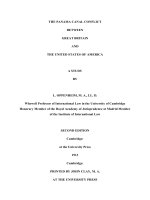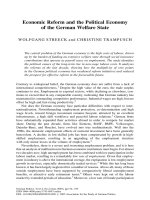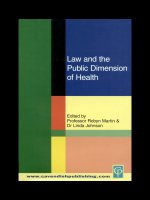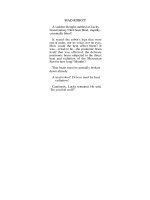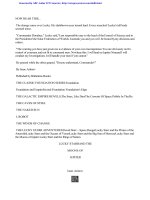lucky starr and the big sun of mercury
Bạn đang xem bản rút gọn của tài liệu. Xem và tải ngay bản đầy đủ của tài liệu tại đây (443.25 KB, 169 trang )
MAD ROBOT!
A sudden
thought stabbed at Lucky.
Great Galaxy! He'd been blind, stupidly,
criminally blind!
It
wasn't the robot's legs that were
out of order, nor its voice, nor its eyes.
How could the heat affect them? It
was—it had to be—the positronic brain
itself that was affected; the delicate
positronic brain subjected to the direct
heat and radiation of the Mercurian
Sun for how long? Months?
That brain must be partially broken
down already.
A mad robot! Driven mad by heat
radiation!
Cautiously, Lucky retreated. He said,
"Do you feel well?"
By Isaac Asimov
Published by Ballantine Books:
THE CLASSIC FOUNDATION SERIES:
Foundation
Foundation and Empire
Second Foundation
Foundation's Edge
THE GALACTIC EMPIRE NOVELS: The
Stars, Like Dust The Currents of
Space Pebble in the Sky
THE CAVES OF STEEL
THE NAKED SUM
I, ROBOT
THE WINDS OF CHANGE
LUCKY STARR
AND
THE BIG SUN
OF MERCURY
Isaac Asimov
writing as Paul French
A Del
Key
Book
BALL
ANTI
NE
BOO
KS •
NEW
ORK
VL: 7 + up
RLL
IL: 8 + up
A Del Rey Book
Published by Ballantine Books
Copyright © 1956 by Doubleday and Company, Inc.
Preface Copyright 1978 by Isaac Asirnov
All rights reserved under International and Pan-American Copyright
Conventions. Published in the United States by Ballantine Books,
a division of Random House, Inc., New York, and simultaneously
in Canada by Random House of Canada Limited, Toronto.
ISBN 0-345-31439-5
This edition published by arrangement with
Doubleday and Company, Inc.
Manufactured in the United States of America
First Ballantine Books Edition: February 1984
Cover art by Darrell K. Sweet
CONTENTS
1 The Ghosts of the Sun 11
2 Mad or Sane? 21
3 Death Waits in a Room 31
4 Over the Banquet Table 41
5 The Direction of Danger 51
6 Preparations 61
7 The Mines of Mercury 71
8 The Enemy in the Mines 83
9 Dark and Light 93
10
The Sun-Side
103
11
Saboteur! 113
12 Prelude to a Duel 123
13 Results of a Duel 133
14 Prelude to a Trial 143
15 The Trial 153
16 Results of the Trial 165
To Robyn Joan, who
did her best to interfere.
LUCKY STARR
and THE BIG
SUN OF MERCURY
Preface
Back in the 1950s, I wrote a series of six derring-do
novels about David "Lucky" Starr and his battles
against malefactors within the Solar System. Each of
the six took place in a different region of the system,
and in each case I made use of the astronomical facts
—as they were then known.
Now, a quarter-century later, Fawcett is bringing
out the novels in new editions; but what a quarter-
century it has been! More has been learned about the
worlds of our Solar System in this last quarter-century
than in all the thousands of years that went before.
LUCKY STARR AND THE BIG SUN OF MER-
CURY was written in 1955 and at that time, astrono-
mers were convinced that Mercury presented only one
face to the Sun, and that it rotated on its axis in 88
days, which was exactly the length of the year. I made
that conviction a central part of the plot of the book.
In 1965, however, astronomers studied radar-beam
reflections from the surface of Mercury and found, to
their surprise, that this was not so. Mercury rotates on
its axis in 59 days, so that there is no perpetual day-
side or night-side.
Every part of the planet gets both day and night,
and the Sun moves in a rather complicated path in
Mercury's sky, growing larger and smaller, and back-
tracking on some occasions. If I were writing this book
today, I would take all this into account,
10
I hope my Gentle Readers enjoy this book anyway,
as an adventure story, but please don't forget that the
advance of science can outdate even the most con-
scientious science-fiction writer and that my astronom-
ical descriptions are no longer accurate in all respects.
ISAAC ASIMOV
1
The Ghosts of the Sun
Lucky Starr and his small friend, John Bigman Jones,
followed the young engineer up the ramp toward the
air lock that led to the surface- of the planet Mercury.
Lucky thought: At least things are breaking fast.
He had been on Mercury only an hour. He had had
scarcely time to do more than see his ship, the Shooting
Starr, safely stowed in the underground hangar. He
had met only the technicians who had handled the
landing red tape and seen to his ship.
Those technicians, that is, and Scott Mindes, engi-
neer in charge of Project Light. It had been almost as
though the young man had been lying in wait. Almost
at once he had suggested a trip to the surface.
To see some of the sights, he had explained.
Lucky did not believe that, of course. The engineer's
small-chinned face had been haunted with trouble, and
his mouth twitched as he spoke. His eyes slid away
from L'ucky's cool, level glance.
Yet Lucky agreed to visit the surface. As yet, all he
knew of the troubles on Mercury was that they posed a
ticklish problem for the Council of Science. He was
willing to go along with Mindes and see where that led
him.
As for Bigman Jones, he was always glad to follow
11
12
Lucky anywhere and any time, for any reason and no
reason.
But it was Bigman whose eyebrows lifted as all three
were getting into their suits. He nodded almost unno-
ticeably toward the holster attachment on Mindes's
suit.
Lucky nodded calmly in return. He, too, had noticed
that protruding from the holster was the butt of a
heavy-caliber blaster.
The young engineer stepped out onto the surface of
the planet first. Lucky Starr followed and Bigraan came
last.
For the moment, they lost contact with one another
in the nearly total darkness. Only the stars were visible,
bright and hard in the cold airlessness.
Bigman recovered first. The gravity here on Mercury
was almost exactly equal to that on his native Mars.
The Martian nights were almost as dark. The stars in
its night sky were almost as brilliant.
His treble voice sounded brightly in the receivers of
the others. "Hey, I'm beginning to make things out."
So was Lucky, and the fact puzzled him. Surely
starlight could not be that bright. There was a faint,
luminous haze that lay over the fumbled landscape and
touched its sharp crags with a pale milkiness.
Lucky had seen something of the sort on the Moon
during its two-week-long night. There, also, was the
completely barren landscape, rough and broken. Never,
in millions of years, either there on the Moon or here
on Mercury, had there been the softening touch of wind
or rain. The bare rock, colder than imagination could
13
picture, lay without a touch of frost in a waterless
world.
And in the Moon's night, too, there had been this
milkiness. But there, over half the M'oon at least, there
had been Earth-light. When Earth was full it shone
with sixteen times the brightness of the full Moon as
seen from Earth.
Here on Mercury, at the Solar Observatory at the
North Pole, there was no near-by planet to account for
the light.
"Is that starlight?" he finally asked, knowing it
wasn't.
Scott Mindes said wearily, "That's the coronal glim-
mer."
"Great Galaxy," said Lucky with a light laugh. "The
corona! Of course! I should have known!"
''Known what?" cried Bigman. "What's going on?
Hey, Mindes, come on, give!"
Mindes said, "Turn around. You've got your back
to it."
They all turned. Lucky whistled softly between his
teeth; Bigman yelped with surprise. Mindes said noth-
ing.
A section of the horizon was etched sharply against
a pearly region of the sky. Every pointed irregularity of
that part of the horizon was in keen focus. Above it,
the sty was in a soft glow (fading with height) a third
of the way to the zenith. The glow consisted of bright,
curving streamers of pale light.
"That's the corona, Mr. Jones," said Mindes.
Even in his astonishment Bigman was not forgetful
of his own conception of the proprieties. He growled,
14
"Call me Bigman." Then he said, "You mean the
corona around the Sun? I didn't think it was that big."
"It's a million miles deep or more," said Mindes,
"and we're on Mercury, the planet closest to the Sun.
We're only thirty million miles from the Sun right now.
You're from Mars, aren't you?"
"Born and bred," said Bigman.
"Well, if you could see the Sun right now, you'd
find it was thirty-six times as big as it is when seen from
Mars, and so's the corona. And thirty-six times as
bright too."
Lucky nodded. Sun and corona would be nine times
as large as seen from Earth. And the corona could not
be seen at all on Earth, except during periods of total
eclipse.
Well, Mindes had not altogether lied. There were
sights to be seen on Mercury. He tried to fill out the
corona, to imagine the Sun it surrounded which was
now hidden just below the horizon. It would be a
majestic sight!
Mindes went on, an unmistakable bitterness in his
voice. "They call this light 'the white ghost of the
Sun.'"
Lucky said, "I like that. A rather good phrase."
"Rather good?" said Mindes savagely. "I don't think
so. There's too much talk about ghosts on this planet.
This planet's all jinx. Nothing ever goes right on it. The
mines failed . . ." His voice trailed off.
Lucky thought: We'll let that simmer.
Aloud he said, "Where is this phenomenon we were
to see, Mindes?"
"Oh yes. We'll have to walk a bit. Not far, consider-
ing the gravity, but watch your footing. We don't have
15
roads here, and the coronal glimmer can be awfully
confusing. I suggest the helmet lights."
He clicked his on as he spoke, and a shaft of light
sprang out from above the face-plate, turning the
ground into a rough patchwork of yellow and black.
Two other lights flashed on, and the three figures
moved forward on their thickly insulated boots. They
made no sound in the vacuum, but each could sense the
soft vibrations set up by each footfall in the air within
their suits.
Mindes seemed to be brooding about the planet as
he walked. He said in a low, tense voice, "I hate Mer-
cury. I've been here six months, two Mermurian years,
and I'm sick of it. I didn't think I'd be here more than
six months to begin with, and here the time's up and
nothing's done. Nothing. Everything about this place is
wrong. It's the smallest planet. It's the closest to the
Sun. Only one side faces the Sun. Over there"—and
his arm swung in the direction of the corona's gleam—
"is the Sun-side, where it gets hot enough in places to
melt lead and boil sulfur. Over there in the other direc-
tion"—again his arm swung—"is the one planetary
surface in the whole Solar System that never sees the
Sun. Everything about the place is miserable."
He paused to jump over a shallow, six-foot-wide rift
in the surface, a reminder of some eons-old Mercury-
quake, perhaps, which could not heal over without
wind and weather. He made the jump clumsily, the
picture of an Earthman who, even on Mercury, stayed
close to the artificial gravity of the Observatory Dome.
Bigman clicked his tongue disapprovingly at the
sight. He and Lucky negotiated the jump with scarcely
anything more than a lengthening of stride.
16
A quarter mile farther on, Mindes said abruptly,
"We can see it from here, and just in time too."
He stopped, teetering forward, with arms outflung
for balance. Bigman and Lucky halted with a small
hop which kicked up a spurt of gravel.
Mindes's helmet flash went out. He was pointing.
Lucky and Bigman put out their own lights and there,
in the darkness, where Mindes had pointed, was a
small, irregular splotch of white.
It was brilliant, a more burning sunshine than Lucky
had ever seen on Earth.
"This is the best angle for seeing it," said Mindes.
"It's the top of Black and White Mountain."
"Is that its name?" asked Bigman.
"That's right. You see why, don't you? It stands just
far enough nightward of the Terminator That's
the boundary between the dark-side and the Sun-side."
"I know that," said Bigman indignantly. "You think
I'm ignorant?"
"I'm just explaining. There's this little spot around
the North Pole, and another around the South Pole,
where the Terminator doesn't move much as Mercury
circles the sun. Down at the Equator, now, the Termi-
nator moves seven hundred miles in one direction for
forty-four days and then seven hundred miles back in
the next forty-four. Here it just moves half or mile or
so altogether, which is why this is a good place for an
observatory. The Sun and the stars stand still.
"Anyway, Black and White Mountain is just far
enough away so that only the top half of it is lit up at
most. Then, as the Sun creeps away, the light moves up
the mountain slopes."
17
"And now," interposed Lucky, "only the peak is lit
up."
"Only the top foot or two maybe, and that will be
gone soon. It will be all dark for an Earth-day or two,
and then the light starts coming back."
Even as he spoke the white splotch shrank to a dot
that burned like a bright star.
The three men waited.
"Look away," advised Mindes, "so that your eyes
get accustomed to darkness."
And after slow minutes he said, "All right, look
back."
Lucky and Bigman did so and for a while saw
nothing.
And then it was as though the landscape had turned
bloody. Or a piece of it had, at any rate. First there was
just the sensation of redness. Then it could be made
out, a rugged mountain climbing up to a peak. The
peak was brightly red now, the red deepening and
fading as the eye traveled downward until all was
black.
"What is it?" asked Bigman.
"The Sun," said Mindes, "has sunk just low enough
now so that, from the mountain peak, all that remains
above the horizon is the corona and the prominences.
The prominences are jets of hydrogen gas that lift
thousand of miles above the Sun's surface, and they're
a bright red in color. Their light is there all the time,
but ordinary sunlight drowns it out."
Again Lucky nodded. The prominences were again
something which on Earth could be seen only during a
total eclipse or with special instruments, thanks to the
atmosphere.
18
"In fact," added Mindes in a low voice, "they call
this 'the red ghost of the Sun.' "
"That's two ghosts," said Lucky suddenly, "a white
one and a red one. Is it because of the ghosts that you
carry a blaster, Mr. Mindes?"
Mindes shouted, "What?" Then, wildly, "What are
you talking about?"
"I'm saying," said Lucky, "that it's time you told us
why you really brought us out here. Not just for the
sights, I'm sure, or you wouldn't carry a blaster on an
empty, desolate planet."
It took a while for Mindes to answer. When he did,
he said, "You're David Starr, aren't you?"
"That's right," said Lucky patiently.
"You're a member of the Council of Science. You're
the man they call Lucky Starr."
Members of the Council of Science shunned pub-
licity, and it was with a certain reluctance that Lucky
said again, "That's right."
"Then I'm not wrong. You're one of their ace inves-
tigators, and you're here to investigate Project Light."
Lucky's lips thinned as they pressed together. He
would much rather that were not so easily known. He
said, "Maybe that's true, maybe it isn't. Why did you
bring me here?"
"I know it's true, and I brought you here"—Mindes
was panting—"to tell you the truth before the others
could fill you—full of—lies."
"About what?"
"About the failures that have been haunting—I hate
that word—the failures in Project Light."
"But you might have told me what you wanted to
back at the Dome. Why bring me here?"
19
"For two reasons," said the engineer. His breathing
continued rapid and difficult. "In the first place, they
all think it's my fault. They think I can't pull the
project through, that I'm wasting tax money. I wanted
to get you away from them. Understand? I wanted to
keep you from listening to them first."
"Why should they think it's your fault?"
"They think I'm too young."
"How old are you?"
"Twenty-two."
Lucky Starr, who wasn't very much older, said,
"And your second reason?"
"I wanted you to get the feeling of Mercury. I
wanted you to absorb the—the " He fell silent.
Lucky's suited figure stood straight and tall on Mer-
cury's forbidding surface, and the metal of one shoulder
caught and reflected the milky light of the corona, "the
white ghost of the Sun."
He said, "Very well, Mindes, suppose I accept your
statement that you are not responsible for failures in the
project. Who is?"
The engineer's voice was a vague mutter at first. It
coalesced gradually into words. "I don't know At
least- "
"I don't understand you," said Lucky.
"Look," said Mindes desperately, "I've investigated.
I spent waking and sleeping periods trying to pinpoint
the blame. I watched everybody's movements. I noted
times when accidents took place, when there were
breaks in the cables or when conversion plates were
smashed. And one thing I'm sure of "
"Which is?"
"That nobody at the Dome can be directly responsi-
20
ble. Nobody. There are only about fifty people in the
Dome, fifty-two to be exact, and the last six times
something has gone wrong I've been able to account for
each one. Nobody was anywhere near the scenes of the
accidents." His voice had gone high-pitched.
Lucky said, "Then how do you account for the
accidents? Mercury-quakes? Action of the Sun?"
"Ghosts!" cried the engineer wildly, flinging his arms
about. "There's a white ghost and a red ghost. You've
seen those. But there are two-legged ghosts too. I've
seen them, but will anyone believe me?" He was almost
incoherent. "I tell you I tell you "
Bigman said, "Ghosts! Are you nuts?"
At once Mindes screamed, "You don't believe me
either. But I'll prove it. I'll blast the ghost. I'll blast the
fools who won't believe me. I'll blast everyone. Every-
one!"
With a harsh screech of laughter he had drawn his
blaster, and with frenzied speed, before Bigman could
move to stop him, he had aimed it at Lucky at point-
blank range and squeezed its trigger. Its invisible field
of disruption lashed out
2
Mad or Sane?
It would have been the end of Lucky if he and Mindes
had been on Earth.
Lucky had not missed the gathering madness in
Mindes's voice. He had been waiting carefully for some
break, some action to suit the violence of the engineer's
hard-breathed sentences. Yet he had not entirely ex-
pected an outright assault with the blaster.
When Mindes's hand flashed to his holster, Lucky
leaped to one side. On Earth, that movement would
have come too late.
On Mercury, however, matters were different. Mer-
cury's gravity was two fifths that of Earth, and Lucky's
contracting muscles threw his abnormally light body
(even including the suit he wore) farther to one side.
Mindes, unaccustomed to low gravity, stumbled as he
turned too quickly in order that his blaster might follow
Lucky's motion.
The blaster's energy, therefore, struck bare ground,
inches from Lucky's sinking body. It gouged a foot-
deeo hole into the frigid rock.
Before Mindes could recover and aim again, Bigman
had struck him at the end of a long, iow tackle carried
through with the natural grace of a born Martian accus-
tomed to low gravity.
21
22
Mindes went down. He shrieked wordlessly and then
was silent, whether unconscious as the result of the fall
or as the climax of his fevered emotions could not be
told.
Bigman did not believe either possibility. "He's
shamming," he cried passionately. "The dirty cobber is
playing dead." He had wrenched the blaster from the
fallen engineer's unresisting grip, and now he pointed it
at the man's head.
Lucky said sharply, "None of that, Bigman."
Bigman hesitated. "He tried to kill you, Lucky." It
was obvious that the little Martian would not have been
half as angry if it had merely been himself who had
been in danger of death. Yet he backed away.
Lucky was on his knees examining Mindes's face
through the face-plate, shining his helmet light onto the
other's pale, drawn features. He checked the pressure
gauge of Mindes's suit, making sure the shock, of the
fall had not loosened any of its joints. Then, seizing the
fallen figure by a wrist and ankle, he slung it across his
shoulders and rose to his feet.
"Back to the Dome," he said, "and, I'm afraid, to a'
problem that's a little more complicated than the Chief
thinks."
Bigman granted and followed Lucky's long stride
closely, his own smaller build forcing him into a
gravity-lengthened half trot. He kept his blaster ready,
maneuvering his position to enable him, in case of
need, to strike at Mindes without blasting down Lucky.
The "Chief was Hector Conway, head of the Coun-
cil of Science. At more informal times he was called
Uncle Hector by Lucky, since it was Hector Conway,
23
along with Augustus Henree, who were the guardians
of the young Lucky after the death of Lucky's parents
as the result of a pirate attack near the orbit of Venus.
A week earlier Conway had said to Lucky with a
casual air, almost as though he were offering him a
vacation, "How would you like to go to Mercury,
Lucky?"
"What's up, Uncle Hector?" asked Lucky.
"Nothing really," said Conway, frowning, "except
some cheap politics. We're supporting a rather expen-
sive project up at Mercury, one of those basic research
things that may come to nothing, you know, and, on
the other hand, may turn out to be quite revolutionary.
It's a gamble. All those things are."
Lucky said, "Is it anything I know about?"
"I don't think so. It's quite recent. Anyway, Senator
Swenson has pounced on it as an example of how the
Council wastes taxpayers' money. You know the line.
He's pressing for an investigation, and one of his boys
went out to Mercury some months ago."
"Senator Swenson? I see." Lucky nodded. This was
nothing new. The Council of Science over the past
decades had slowly come to the fore of the fight against
the dangers to Earth from both within and without the
Solar System. In this age of Galactic civilization, with
humanity spread through all the planets of all the stars
in the Milky Way, only scientists could properly cope
with mankind's problems. In fact, only the specially
trained scientists of the Council were adequate.
Yet there were some men of Earth's government who
feared the growing power of this Council of Science
and others who used this suspicion to further their own
ambitions. Senator Swenson was the foremost of the
24
latter group. His attacks, usually directed against the
Council's "wasteful" way of supporting research, were
making him famous.
Lucky said, "Who's the man in charge of the project
on Mercury? Anyone I know?"
"It's called Project Light, by the way. And the man
in charge is an engineer named Scott Mindes. A bright
boy, but he's not the man to handle this. The most
embarrassing thing is that since Swenson kicked up this
fuss all sorts of things have been going wrong with
Project Light."
"I'll look into it if you wish, Uncle Hector."
"Good. The accidents and bad breaks are nothing,
I'm sure, but we don't want Swenson. to maneuver us
into some bad-looking spot. See what he's up to. And
watch out for that man of his. Urteil is his name and he
has a reputation of being a capable and dangerous fel-
low."
So that was all it started out as. Just a bit of investi-
gation to forestall political difficulties. Nothing more.
Lucky landed on Mercury's North Pole expecting
nothing more, and in two hours found himself at the
wrong end of a. blaster bolt.
Lucky thought as he slogged back to the Dome with
Mindes over his shoulders: There's more than just a bit
of politics here.
Dr. Karl Gardoma stepped out of the small hospital
room and faced Lucky and Bigman somberly. He was
wiping his strong hands on a pad of fluffy plastosorb,
which he tossed into the disposal unit when he finished.
His dark-complexioned face, almost brown, was dis-
turbed, his heavy eyebrows lowering. Even his black
25
hair, cut close so that it stood up stiffly in thick array,
seemed to accentuate his troubled appearance.
"Well, Doctor?" said Lucky.
Dr. Gardoma said, "I've got him under sedation.
He'll be all right when he wakes. I don't know if he'll
remember clearly what happened."
"Has he had attacks like this before?"
"Not since he came to Mercury, Mr. Starr. I don't
know what happened before then, but these last few
months he's been under a great strain."
"Why?"
"He feels responsible for the accidents that have
been interfering with the progress of Project Light."
"Is he responsible?"
"No, of course not. But you can see how he feels.
He's sure everyone blames him. Project Light is vitally
important. A great deal of money and effort has been
put into it. Mindes is in charge of ten construction
men, all five to ten years older than he is, and of an
enormous amount of equipment."
"How does it happen he's so young?"
The doctor smiled grimly, but despite his grimness
his white, even teeth made him look pleasant, even
charming. He said, "Sub-etheric optics, Mr. Starr, is a
completely new branch of science. Only young men,
fresh out of school, know enough about it."
"You sound as though you know a bit about it
yourself."
"Only what Mindes told me. We arrived in Mercury
on the same ship, you know, and he fascinated me,
quite won me over with what his project hopes to
accomplish. Do you know about it?"
"Not a thing."
26
"Well, it involves hyperspace, that portion of space
that lies outside the ordinary boundary of the space we
know. The laws of nature that apply to ordinary space
don't apply to hyperspace. For instance, in ordinary
space it is impossible to move faster than the speed of
light, so that it would take at least four years to reach
the nearest star. In going through hyperspace any speed
is possible " The physician broke off with a sud
den, apologetic smile. "You know all this, I'm sure."
"I suppose most people know that the discovery of
hyperspatial flight made travel to the stars possible,"
said Lucky, "but what about Project Light?"
"Well," said Dr. Gardoma, "in ordinary space, light
travels in straight lines in a vacuum. It can only be
bent by large gravitational forces. In hyperspace, on the
other hand, it can be bent as easily as if it were a cotton
thread. It can be focused, dispersed, bent back upon
itself. That's what the theory of hyperoptics says."
"And Scott Mindes, I suppose, is here to test that
theory."
"That's right."
"Why here?" asked Lucky. "I mean, why on Mer-
cury?"
"Because there's no other planetary surface in the
Solar System where there is such a concentration of
light over so large an area. The effects Mindes is look-
ing for can be detected most easily here. It would be a
hundred tunes as expensive to set up the project on
Earth, and results would be a hundred times as uncer-
tain. So Mindes tells me."
"Only now we're having these accidents."
Dr. Gardoma snorted. "They're no accidents. And,
Mr. Starr, they have to be stopped. Do you know what
